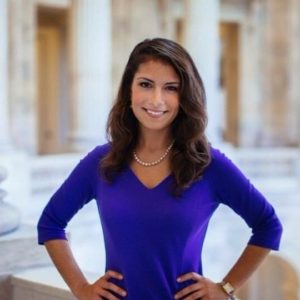 What’s Next with Nicole is a biweekly opinion column. The views expressed are solely the author’s.
What’s Next with Nicole is a biweekly opinion column. The views expressed are solely the author’s.
(Updated at 10:25 a.m.) This year has certainly not been normal. Between the murders of George Floyd, Breonna Taylor, and Ahmaud Arbery, and the disproportionate impact that COVID-19 has had on black and brown communities in our country, we continue to need to dig deep and to understand the why, to reflect, and to do better.
I watched the split screen of President Trump advocating the usage of our military against protesters across the country in his Rose Garden address, with another screen showing Arlington County Police on the front lines advancing against peaceful protesters prior to curfew in D.C. I was dismayed and broken-hearted. This was so inconsistent with the images I had been seeing of ACPD helping to block traffic and handing out water to peaceful protesters.
Thankfully, Arlington’s leadership quickly responded and acknowledged the problem. They took decisive and immediate action, and have vowed to re-evaluate the agreement that led to this situation to ensure our policing efforts better reflect the values of our community.
Changing course in inherently flawed systems isn’t easy, but it is necessary. This step was necessary and in a time that many leaders are unable to see a problem in their system, own it, and fix it we are lucky to have leadership with the willingness to do so. This applause though is not for a mission accomplished. This is just the beginning of a larger conversation.
First, we should continue our community conversation about policing. We need to support the national NAACP in their push for:
- A ban on the use of knee holds and chokeholds as an acceptable practice for police officers.
- Clear rules on the escalation for the Use of Force Continuum.
- A ban on shielding from the public officer misconduct information and disciplinary histories in each state’s Open Records Act and denial of recertification credentials for police officers if it is determined that their use of deadly force was unwarranted by federal guidelines.
- Implementation of Citizen’s Review Boards in municipalities to hold police departments accountable and build public confidence. Arlington NAACP also supports this and states that over 70 communities across the country, including Fairfax, already have one.
Additionally, we should continue our conversation about economic inequalities and building black wealth. When looking for a black-owned business for dinner this weekend I ran into a wall. After crowdsourcing on Arlington Neighbors Helping Each Other Through COVID-19, I found four Arlington black-owned restaurants where I could order dinner, six if I included one coffee shop and an ice cream store.
We must also continue our conversation about diversity within our state representation. Currently, of our seven state delegation members, all are white with the exception of one person of color. Our Human Rights Commission is currently the only commission or working group with a black person or person of color as chair (starting next month that will change with new leadership that includes people that are both black and other people of color).
Furthermore, we should continue our conversation about racial health inequalities now during COVID-19, as well as during less tumultuous times. How do we make sure black and brown people are not dying at disproportionate rates in our community?
Finally, we must continue this conversation about race and white privilege, on every front in our community: from policy to policing, to zoning, healthcare, to school boundaries, small businesses. So many of us are asking what we can do. We can listen, we can ask why, we can do better — we can actively work for change.
Nicole Merlene is an Arlington native and former candidate for Virginia State Senate. She has served as a leader in the community on the boards of the Arlington County Civic Federation and North Rosslyn Civic Association, as an Arlington Economic Development commissioner, in neighborhood transportation planning groups, and as a civic liaison to the Rosslyn Business Improvement District.

